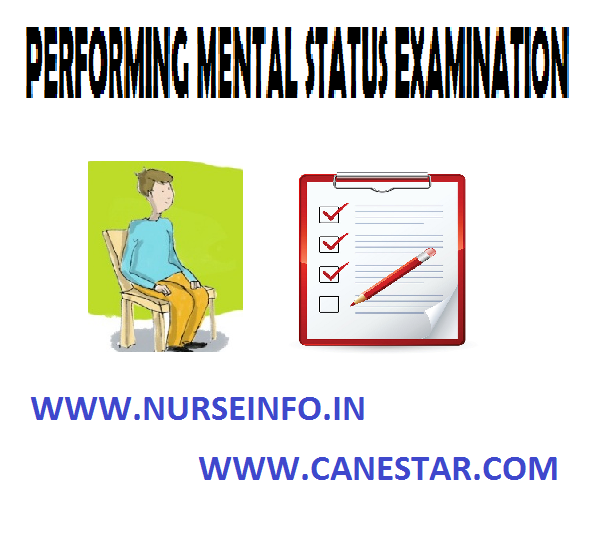PERFORMING MENTAL STATUS EXAMINATION – Definition, Purpose, General Instructions and Format for Mental Status Examination (Mental Health Nursing)
DEFINITION
Mental status examination (MSE) is an assessment of general motor behavior, thought and emotional functioning, along with evaluation of insight and judgment of the patient’s current status
PURPOSE
- Mental status examination serves as a basis for comparison, to track the progress of patient
- It is used to detect changes or abnormalities in a person’s psychological functioning
- Perform a physical assessment from head to toe including vital signs
- Provide a comfortable environment for mental status examination
- Prepare some questions under each aspect of mental status examination
FORMAT FOR MENTAL STATUS EXAMINATION
Instructions
- Write observation findings obtained from patient in the space given
- Give details wherever required
- Identification data
- Name, b. age, c. sex, d. bed no, e. data of MSE, f. time of MSE – date of admission, diagnosis:
- General appearance
- Consciousness, b. body built, c. personal hygiene, d. grooming, e. facial expression, f. eye contact – well built/moderately built/emaciated
- Speech
- Language, b. reaction time, c. unusual words, d. volume, e. rate, f. characteristics
- Motor activity
- Level of activity, b. mannerisms, c. type of activity
- Mood of affect
- Sad/happy/irritable/angry/suspicious/fearful/restless/worried/any other (specify)
- Perception
- Hallucination: present/absent, if present specify
- Type: visual/auditory/tactile/olfactory
- Illusion: present /absent
- Thought
- Stream of thought: normal/increased/reduced/blocked/any other, if present specify
- Content: neologism/clang association, if present specify
- Form: circumstantiality/tangentiality/flight of ideas, if present specify
- Orientation
- Oriented to time, place, person: present/absent
- Confusion: present/absent
- Memory
- Remote: intact/impaired
- Recent: intact/impaired
- Immediate: intact/impaired
- Judgment
- Logical/illogical (specify)
- Attention and concentration: good/distracted/pre-occupied/any other
- Intelligence
- Educational status,
- b. learning disability: present/absent, if present specify
- I.Q. level
- General knowledge
- Insight: present/absent
- Psychological factors
- Stressor: present/absent, if present specify
- Coping skills (specify)
- Social relation: good/poor
- Occupation
- Physiological factors
- Bowel and bladder habits
- Appetite
- Sleep
- Libido
- Summary
List of problems


